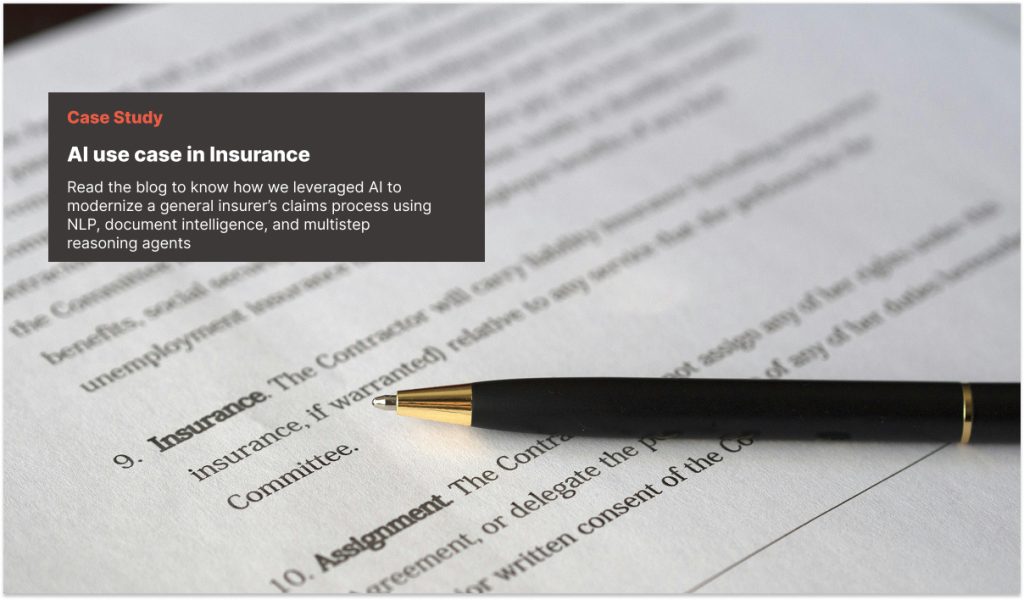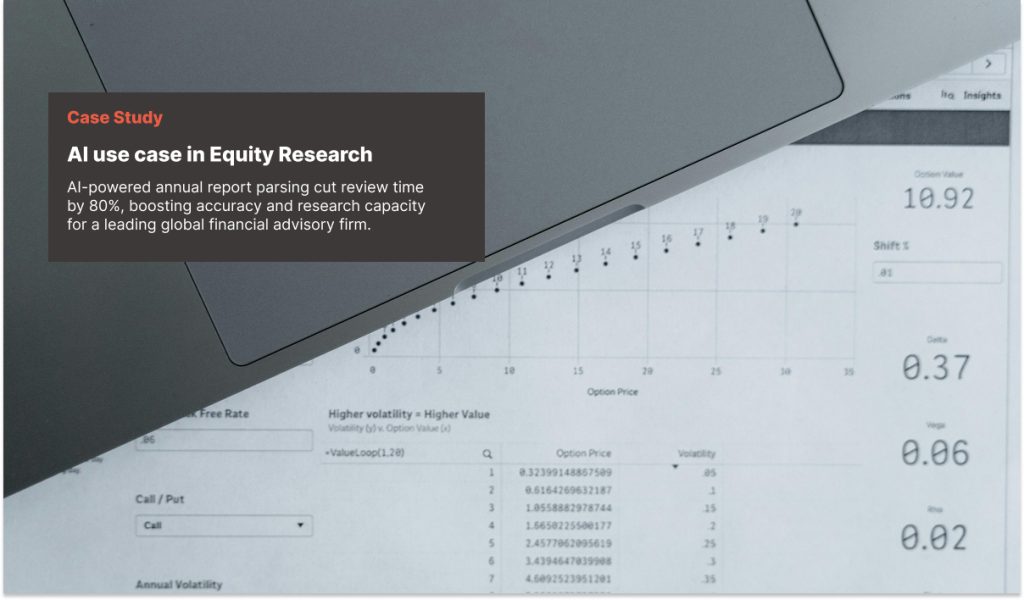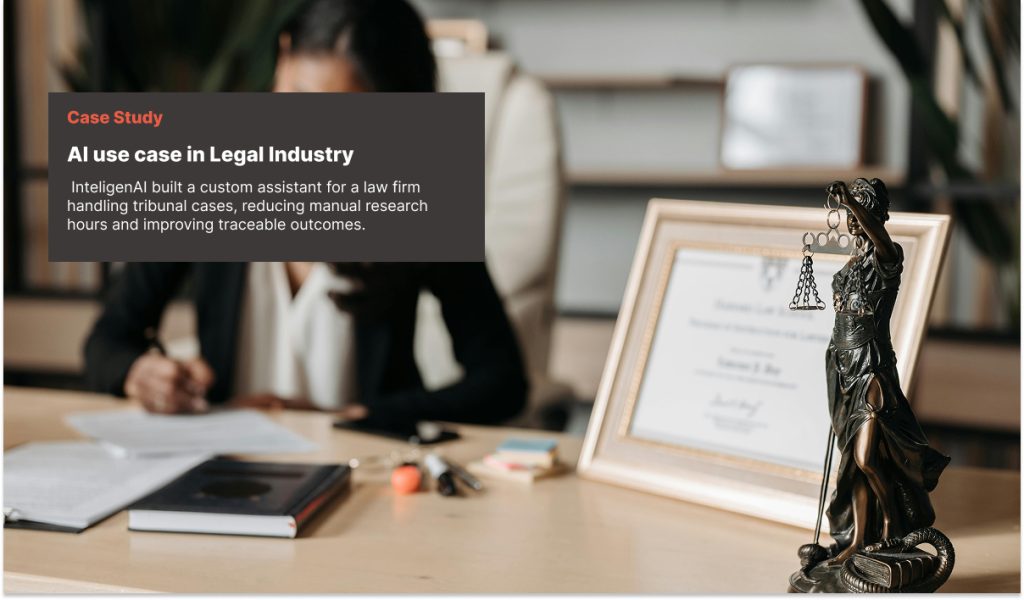AI legal assistants are helping law firms drastically reduce research time, improve accuracy, and build traceable case strategies. This case study from InteligenAI shows how we built a custom AI assistant for a reputed law firm handling tribunal cases.
Executive summary:
Legal research has traditionally been one of the most time-consuming aspects of litigation and advisory work. For firms dealing with tribunal and corporate law cases, the challenge is magnified: documents run into hundreds of pages, precedents are scattered across unstructured repositories, and manual search consumes valuable billable hours.
InteligenAI was approached by a reputed Indian law firm that wanted to transform how it prepared for National Company Law Tribunal (NCLT) cases. Their goal was clear:
- Build an AI-driven assistant that could ingest millions of legal documents.
- Understand complex legal language and contextual relationships.
- Support legal drafting with traceable, non-hallucinated references.
- Scale seamlessly across practice areas and jurisdictions.
Our team designed and deployed a multi-layered AI solution combining knowledge graphs, hybrid document processing, and an agentic framework powered by both large and small language models. This project validated InteligenAI’s capability to build enterprise-grade, domain-specific AI legal assistants that not only improve efficiency but also meet the stringent accuracy and reliability standards of the legal industry.
What challenges did the law firm face?
The firm faced bottlenecks that are common in law practices across India:
-
Manual research fatigue – Junior associates spent hours sifting through judgments, filings, and notes.
-
Fragmented formats – Data existed in PDFs, scanned copies, court portals, and legal websites.
-
Contextual complexity – Understanding how one precedent applied to another required human expertise, not just keyword matches.
-
Traceability gap – Without citations linked to authoritative sources, results were unreliable.
For firms operating under structured tribunal systems such as India’s NCLT or the UK’s High Court and regulatory bodies, these challenges often translate to missed deadlines, inflated research costs, and risk of inaccurate filings.
How did InteligenAI solve it?
We engineered a bespoke legal AI assistant that could adapt to legal language, deliver source-backed results, and scale securely.
1. Legal knowledge graph
This ensured the assistant could move beyond keyword-based search into conceptual understanding of precedents and legal reasoning.
- Created a domain-specific ontology for tribunal law.
- Captured entities such as cases, sections, orders, citations, and outcomes.
- Represented relationships between cases (e.g., cited vs. overruled) to allow semantic search.
- Enabled contextual retrieval from a corpus of 3.5 lakh+ documents.
2. Hybrid document processing
- Applied OCR to scanned filings and old judgments.
- Integrated layout-aware deep learning models to preserve tables, headers, and legal footnotes critical for case interpretation.
- Standardized ingestion pipelines for structured, semi-structured, and unstructured legal text.
- Ensured documents were converted into machine-readable formats without losing legal semantics.
3. Agentic AI framework
- SLMs handled repetitive parsing tasks with lower compute cost, while LLMs were reserved for reasoning-heavy tasks optimizing both speed and cost-efficiency.
- Designed task-specific agents for:
-
Precedent retrieval
-
Clause and section extraction
-
Summarization of long judgments
-
Draft query refinement
-
- Applied retrieval-augmented generation (RAG) to reduce hallucinations.
- All outputs linked back to traceable source documents.
4. Enterprise-grade safeguards
- Enforced GDPR-compliant storage, India’s DPDP Act alignment, and secure APIs.
- Implemented audit trails to validate every AI-generated citation.
What results were achieved?
The AI legal assistant delivered tangible improvements:
- On average, the firm reported a 70% reduction in research time per case.
- Reliable, citation-backed outputs reduced risk of errors and improved courtroom defensibility.
- Scalable architecture allowed quick retraining for new amendments and case types, ensuring adaptability over time.
- Improved drafting quality, enabling associates to prepare filings with higher confidence.
Beyond efficiency gains, the firm was able to serve more clients, reduce dependency on manual research, and position itself as a tech-forward law practice.
How can AI help law firms?
The global legal landscape faces multiple challenges. By adopting AI-powered assistants like the one we built, law firms can:
- Shorten case prep timelines from weeks to days.
- Improve accuracy in compliance-heavy areas (e.g., financial law, insolvency, contracts).
- Standardize research outputs across junior and senior teams.
- Free lawyers to focus on strategic, client-facing work.
Explore custom AI solutions for your law firm
We have 30+ implemented solutions, covering over 9 industry segments. Our expertise is in building world-class AI solutions for any industry.

AI use case in Insurance
Our AI solution demonstrated how AI can augment, not replace, human expertise in complex, regulated environments...

AI use case in Equity Research
A leading financial advisory and compliance consulting firm serving over faced a major challenge. Their analysts spent

AI use case in Legal Industry
We built a custom AI assistant for a law firm handling tribunal cases, reducing manual research hours and improving traceable outcomes.
The structure of this piece is excellent.